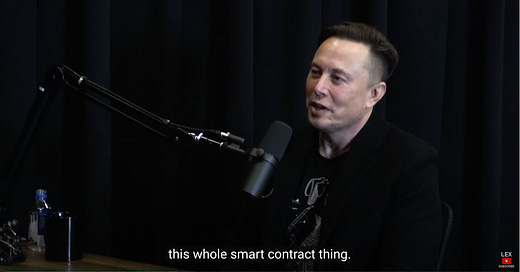If Elon Musk is too dumb for smart contracts, what hope do the rest of us have?
As Ethereum enters the mainstream, I am watching many brilliant people get confused about why we need a protocol that can run unstoppable code across the world

On Lex Fridman’s podcast, Elon musk joked about being too dumb to understand smart contracts and then quickly moved on to how he likes to do deals with lawyers. This was a throwaway comment but it speaks to a huge issue I am seeing with how Ethereum is being viewed in the world. Put simply:
A lot of very smart people struggle to see why they would need a smart contract in their life.
I think this is similar to previous technological trends:
💻 1980s - What would I do with a computer in my home?
💌 1990s - Why would I need to connect to the internet?
📱 2000s - What is the point in having a phone with internet?
🌄 2010s - Who would want to post about their life online all the time?
As Ethereum starts to influence mainstream culture more, I am noticing that some of the most powerful people in the world are misunderstanding the power of unstoppable code.
If you are curious, you can watch the full interview with Elon here:
I often feel like I am a left-of-the-bell-curve designer working with right-of-the-bell-curve engineers designing products for the middle of the bell curve. I am certainly not smarter than any of the major critics of Ethereum who are up on the world stage. My only advantage is that I have been asking myself “What applications need a blockchain?” for a lot longer than most people.
Dapps are slow & expensive to use
Does this remind you of any other technological arcs?

When Gavin Wood pitched the concept of dapps in an SF hacker house in 2014, I was totally bemused. That is how many of the biggest names in technology feel now.
Each trend wipes away the titans of the past:
🖥 Desktop: Microsoft laid waste to IBM with the operating system
🕸 Internet: Google avoided Microsoft by building inside Internet Explorer
📱 Mobile: Apple demolished Blackberry by designing a product that made sense
💔 Social: Facebook realised searching inside humans was going to be very valuable
♻️ SAAS: Salesforce found a new way to deliver software to large corporations
💰 Payments: Stripe focused on developers instead of executives to win the market
Each of these trends is represented by a company. The value was captured by the investors, founders & early employees. The exciting thing about this new wave of technology is that it is captured by protocol participants.
People who use dapps are often rewarded with ownership stakes in the systems they benefit from. They become protocol participants just by being involved. Baking ownership systems into the fabric of the internet is wildly powerful and woefully misunderstood.
What applications need a blockchain?
Here are my answers to this question that make some sense to me
When I look at products that use Ethereum, I am constantly asking myself: could this just be done with a database, a rack of servers, and a few legal agreements? Here are some classes of applications that cannot be built that way:
💳 Any transaction that Stripe cannot process: Any fintech company has to bend the knee to the banks they get into bed with. They are finessing an antiquated system. You will never see Stripe processing complicated DeFi trades, DAO votes, or NFT drops.
🌍 Any jurisdiction that has weak property rights: Growing up with a stable currency, a functioning legal system and representative democracy is an unbelievable privilege that many dream of having. Ethereum has captured the minds of many passionate revolutionaries who live under despotic rule and are fed up of scratching out a living inside hyper-inflationary currencies.
🎛 Any global pooling of capital and governance rights: If you have ever done business in more than one jurisdiction, you will know how expensive it is. That costs increases exponentially with each country you add into the mix. Compliance is so expensive that it kills many embryonic ideas. The ability to mix money and minds together inside shared digital wallets is magical.
🏦 Any service that wants to make users owners: There is no legal jurisdiction in the world that allows startups to hand out equity in their company. This is insane. Ethereum has defined a set of programmable ownership standards that allow developers to start handing out digital equity and governance rights in their systems. This is an absolute game changer for creating capitalised communities of people.
How can we make this accessible to everyone?
We must not repeat the mistakes of the past systems over again
The Safari Wallet community is on making all Ethereum-based protocols accessible, affordable & understandable to people with an internet-connected Apple device.
We feel that this focus will allow us to ship an incredible product that is available to a huge number of people. Our mission is to raise the bar for Ethereum wallets by open sourcing all of our work and focusing on the best that Apple ecosystem has to offer.
Apple is never the first to adopt a new protocol. They were late entrants to the Internet, Email, File Sharing & Mobile Web. However, when they do make a move, it is usually a winner. They have been developing products to access protocols for a long time. No one buys iPhone for the screen. They buy it for the access to the apps that light up that screen.






Legend ! Can’t wait to hear you on the NIA pod 🔥🙏❤️🚀👍💥Have a great NYE